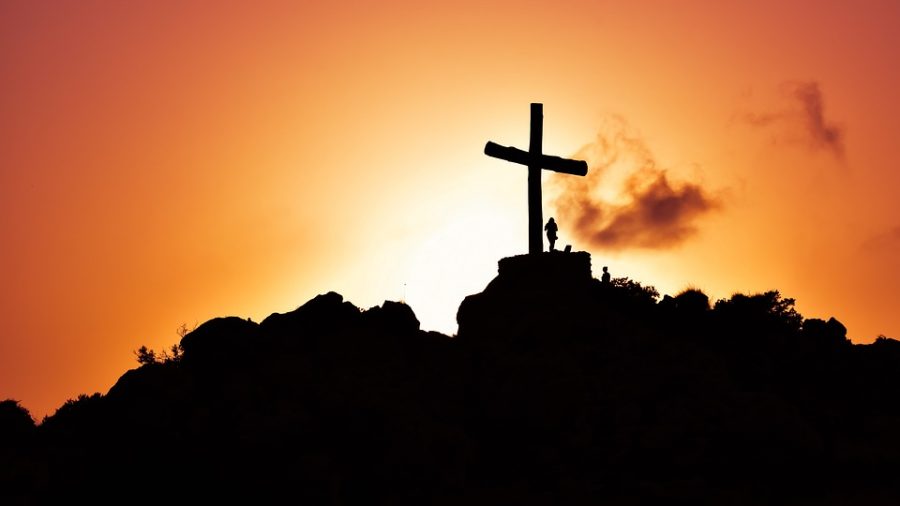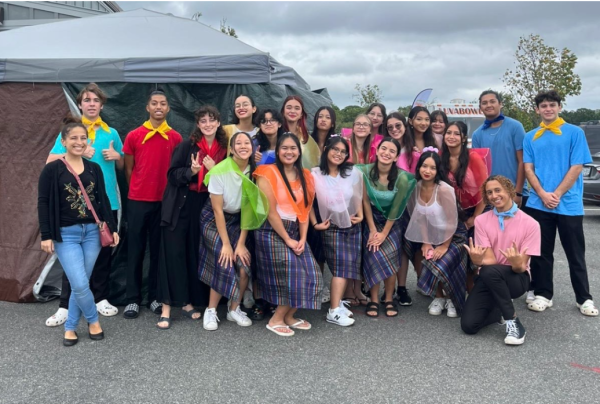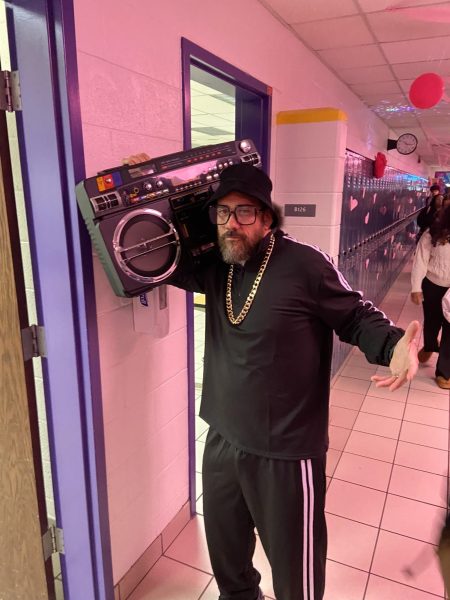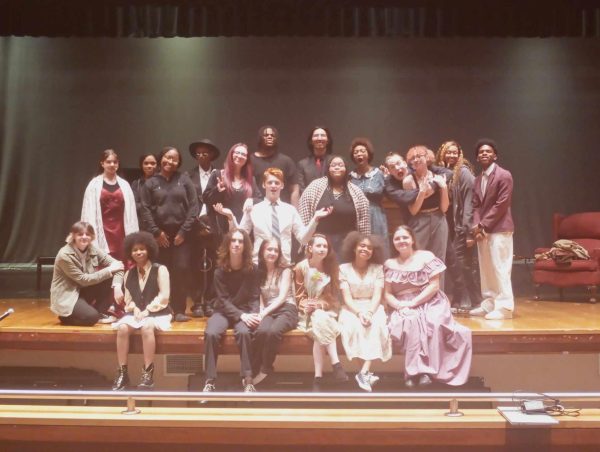One Nation, Under (CENSORED): The tricky politics of religion in schools
March 19, 2018
“I think religion is put on this pedestal, and it’s like we can’t talk about it because it’s too touchy.” -Mr. Benoit, World Religions teacher at Tallwood High School
Well, we’re going to talk about it.
Religion is a sensitive topic. We live in an era where humans are more connected than ever, and this means that we can no longer ignore those who are different than us, those who have different intrinsic beliefs that direct every other aspect of their lives. We’ve grown out of our segregated world, and we have realized that we so deeply disagree with so many other people’s ideas about life, and this has led to a great deal of conflict throughout history, and continues today. We are in an age in which we have learned that it might just be better to not talk about these differences, and this influence can be seen in schools.
Numerous people declined to be interviewed as soon as the word “religion” was uttered. Meanwhile, in the one class that did agree to enter a group discussion on the matter, the conversation got so heated that the teacher had to shut down what had turned into a yelling match. This situation illustrated just how provocative the subject of religion is, and just how deeply it can affect a group of intelligent students.
“In my opinion people get so antagonistic [when it comes to religion] because religion is a primary way that they self-identify,” comments Tallwood government teacher Ms. Voegeli. “It is hard to take off the cloak of religion because it is intertwined with one’s personal and cultural identity.”
There is a wide range of beliefs represented at Tallwood. It is for this reason that the law aims to protect the separation of church and state in public schools: to ensure that students of all religious beliefs can feel safe and represented. As the American Civil Liberties Union states, “[public schools] should be welcoming and nurturing places for students and families of all faiths and beliefs. However, religious freedom in public schools can exist only if school officials maintain a religiously neutral environment” (American Civil Liberties Union).
The intentions of the laws in place are commendable, but the fact is that they cannot provide for all the gray areas that seem to keep popping up in schools throughout the country. Court cases are frequent tacklers of issues such as school-sponsored prayer and proselytizing, student-led prayers at graduation, and many more. The ultimate issue lies in the somewhat ironic fight between protecting freedom of religion and expression, and protecting the separation of church and state in order to ensure that each individual can practice their own religion.
Religious expression is a right guaranteed by the U.S. Constitution, so students and teachers generally gave the same immediate positive responses when asked about their opinions on religious expression in schools.
“I think it’s fine as long as it doesn’t offend other people,” states junior Kyle Vo.
The follow-up question, though, was often greeted with a long pause. What happens if someone else IS offended?
“If it does offend someone else,” began Vo, “I believe that they also have the right to say what they want to say about [other’s] practices. If it really does offend them and they can’t work it out, then I think the people who were practicing it should probably stop.”
Of course, increasing equality and representation is a positive aspect of the modern world, but perhaps the culture of sensitivity has greatly escalated to a point where it feels as if everyone’s mouths are stitched shut by the hypersensitivity of everyone else over every little thing that they could possibly find offensive, and religion makes up a considerable portion of those stitches.
“Because people don’t want to be offended, and they think they have the right to not be offended, it’s now like, ‘this is all you’re allowed to talk about,’” comments Benoit.
Students were asked about a time when they have gotten offended over someone expressing their religious beliefs at school, and they gave a variety of examples.
“People at school will tell me that I’m going to hell because I’m an atheist and I express those beliefs,” comments a student who wished to remain anonymous. “Or they say ‘I’m going to pray for you [to convert],’ and they try to get me to come to church with them, which is like they’re talking down to me, like I’m not really right in the mind and need to be fixed….I know that they mean well, but it just doesn’t come off as meaning well, it comes off as arrogant and condescending. I don’t have any problem with people being religious, it’s more when they try to impose it, and when they look down on you for being different…especially at school.”
This was a common complaint. Evangelism, or the spreading of one’s religious beliefs, is a large part of Christianity and some other religions. However, there is disagreement over whether it is okay for people to evangelize in what is supposed to be a secular environment, such as school.
“I think it is definitely okay for students to evangelize; that is their freedom of speech, that is their freedom of religion,” says Benoit. However, some students feel that evangelism can cross the line into harassment.
“[Students from Young Life] message me all the time, trying to convert me,” states senior Eliza Cohen. “Four members of Young Life have messaged me repeatedly, at different times–I’ve probably been messaged nine or ten times–and I told them: ‘I am not religious. Please stop messaging me.’ And then after that different people from Young Life messaged me four more times….And that’s happened to three other people….They try to press their religion on everybody else, and it’s literally driving me insane.”
This comment about Young Life, a Christian club at Tallwood, inspired some retaliation, but even some members of Young Life had to concede to some points.
“As a member of Young Life, I do agree that some things are a little bit extra, because there’s a lot of non-Christian people that they try to get to come. I think that if a person isn’t Christian then we should leave them alone,” agreed Junior Payton Sinsabaugh.
This opened up a debate over whether schools should be able to sponsor religious activities at all, and there was a diversity of opinions on the subject. Some believed that schools should not sponsor them at all, while some others said that it was okay as long as they did not do anything at school and kept a complete separation.
“I think that it’s okay if the school sponsors an out of school religious activity that is completely optional that doesn’t give anyone anything,” says Junior Luca Pfeiffer.
Others disagreed completely and said that it is their right to organize religious activities in school, and should even be encouraged.
“I definitely believe that, depending on your religion, you should have the freedom to freely express your religion, and I believe school should give you the opportunity and a sufficient amount of time for you to practice that religion….I believe that schools should sponsor religious events, but I think it should be open to multiple religions, so that people have the choice of being informed of their specific practice,” says senior Braydon Beckwith.
Comments on the Christianity of the school system and the lack of representation of other religious groups were frequently mentioned. The only religious organizations that Tallwood offers are Christian organizations, such as Young Life and the Fellowship of Christian Athletes.
“There needs to be a separation of church and state because not everyone is Christian, and that’s what people think,” says Eliza Cohen.
“If they’re gonna sponsor one event, they should sponsor events for all religions, not just one,” adds Payton Sinsabaugh.
Christianity is the largest represented religion in the United States, which is why even though the United States is supposed to be a secular nation, the Christian influence can be seen plentifully in American life. This influence can be seen in schools, including Tallwood High School.
On the condition of anonymity, some student athletes have discussed with the Roaring Gazette how religion can leak into their lives on sports teams. They discussed how their teams will engage in group prayers, and though the athletes are assured that it is not mandatory to participate, students do not typically sit out.
Aside from the concerns over whether there are non-Christian athletes who might feel pressured to join in on a group act that they do not feel entirely comfortable doing, the athletes, according to the ACLU, do have the right to conduct a group prayer, as long as it is student-led, which the students assured that it was. The American Civil Liberties Union states that “students have the right to pray individually or in groups or to discuss their religious views with their peers so long as they are not disruptive….However, the right to engage in voluntary prayer does not include, for example, the right to have a captive audience listen or to compel other students to participate” (American Civil Liberties Union). A coach or sponsor would not be allowed by law to lead a group prayer, as they are representatives of the government and are not allowed to endorse a particular religious view, as it is their duty to maintain the separation of church and state.
Separation of church and state is often interpreted to mean that religion should have no part in government. However, the first part of the First Amendment to the Constitution actually states: “Congress shall make no law respecting an establishment of religion, or prohibiting the free exercise thereof” (US Const. amend. I). This means that the establishment of separation of church and state in actuality revolves around keeping the government out of religious establishments, and that the government is not supposed to restrict religious activity.
Could this mean that religion actually can and does play a significant role in government and in schools? Many students and teachers were quick to deny that religion should play any sort of role in schools, as secularity has grown to be a popular American ideal. Mr. Benoit had a different idea.
“I think everyone is religious, and I think that every conversation, if you boil it down and get far enough, it goes to religion. So if you can’t talk about religion then you’re not allowed to talk about anything,” says Benoit.
Whether or not everyone agrees with this sentiment, it is perhaps an important consideration that everyone has their own internal moral compass, whether or not they consider it to be religion. A person’s life experiences determine their opinions and actions, and to approach differences in opinions in an empathetic manner is perhaps the solution to some of the conflicts we see in schools today. The U.S. Constitution states that each individual has the freedom of expression and religion, and this means that people have the right to hold and express different opinions, and it is up to the individual to engage in discourse over differences in opinion and at the very least make an effort to understand other points of view, instead of losing sight to anger and a sense of self-superiority.
“I think that bad ideas should be defeated with better ideas, instead of bad ideas being shut down and not allowing them to speak,” says Benoit.
Each individual grows up with different religious and world views, and it is time to acknowledge and embrace the vast spectrum of human thoughts and beliefs that give them their purpose in life.
“I find purpose in life because I am a Christian, and a Muslim finds purpose in life because they’re a Muslim, and that’s okay. But when they start teaching their truths, it means that if they’re right, then I’m wrong, and if I’m right, then they’re wrong. And if I’m right, then their entire identity is destroyed. And if they’re right, then my entire identity is destroyed. So instead of facing that challenge and having that conversation, we’d rather just shut it down and ignore it because it’s too hard,” says Benoit.
To open up the topic of religion for discussion in an understanding manner is a feat that the Roaring Gazette challenges its readers to do, for to listen without judgement to another’s internal workings is to catch a glimpse into the soul of humanity, and the soul of oneself.
Citations
“Religion and Public Schools.” American Civil Liberties Union, www.aclu.org/issues/religious-liberty/religion-and-public-schools.
U.S. Constitution. Amend. I





















